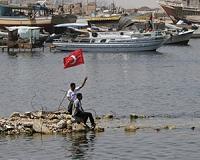| . |  |
. |
Tel Aviv, Israel (UPI) Jun 1, 2010 A report by The Sunday Times of London that Israel plans to deploy its German-built submarines, reputedly armed with nuclear-tipped cruise missiles, off Iran has caused some international jitters. There are concerns, particularly among Middle Eastern governments, that the Jewish state is being pushed into a corner because of its growing international isolation over its treatment of the Palestinians and the actions of its right-wing government. The global outcry over the death of at least nine people Monday in a predawn attack by Israeli naval forces in the eastern Mediterranean on a Turkish-led flotilla carrying humanitarian aid to the Gaza Strip, under economic blockade by Israel since 2006, dramatically underscored Israel's alienation. Growing international pressure on Israel to come clean on the nuclear arsenal it has reputedly built up since the 1960s, at a time when it is so determined to prevent Iran acquiring such weapons, has only heightened Israelis' sense of alienation. Israel has threatened it will unleash unilateral pre-emptive strikes against Iran's nuclear facilities, despite U.S. pressure not to. Israel's deadly action in international waters Monday, branded as piracy by an outraged Turkey, once Israel's most important regional ally, is sure to deepen the rift between Prime Minister Binyamin Netanyahu's hawkish government and the U.S. administration of President Barack Obama. That dispute, the most serious between the two longtime allies in over two decades, stemmed from Netanyahu's rejection of Obama's proposal Israel freeze all settlement activity in the West Bank to allow peace negotiations to get going again. Middle East observers speculated that Israel's actions in the Mediterranean Monday were, in part at least, a reaction to its isolation and the belief that it must be prepared to act unilaterally in the interests of its own security and ignore international opprobrium. In recent weeks, fears of a new war between Israel and Hezbollah, the Shiite Lebanese movement that is Iran's main proxy in the Middle East, have swelled amid bellicose statements by both sides. Israeli claims that Hezbollah has received hundreds of long-range missiles from Syria, Iran's sole Arab ally, have fueled regional-wide concerns that a new conflict is looming. Israel has been bracing for trouble amid growing alarm at Iran's ongoing nuclear program and, more immediately, the threat of massive missile bombardment by the Islamic Republic and its proxies, Hezbollah in Lebanon and Hamas in Gaza. The Israelis believe that if hostilities do erupt, its main population centers, particularly Tel Aviv and the country's industrial heartland, will be targeted, with an unprecedented high civilian casualty toll. In April, U.S. Vice President Joe Biden declared that Israel wasn't about to attack Iran and had agreed to hold off until the impact of a new round of economic sanctions on Iran by the U.N. Security Council could be determined. But in recent weeks, Israeli officials have dismissed the U.S.-proposed sanctions, watered down to get Russia and China on board, as ineffective. As it is, it's likely to take months to determine whether the sanctions are biting or not. The U.S.administration has been promising since Christmas the sanctions would be imposed "in a matter of weeks" and the Israelis are showing distinct signs of impatience, while alleging Iran is just playing for time. In March, Washington's Center for Strategic and International Studies issued a report that suggested Israel could resort to using low-yield, tactical nuclear weapons to destroy Iran's deeply buried nuclear facilities because it didn't have sufficient conventional firepower to do the job. Such an attack, which would be the first nuclear strike since the Americans bombed Hiroshima and Nagasaki in August 1945, would almost certainly result in retaliatory attacks against Israel. But the Israelis could reason that destroying Iran's nuclear program, or even delaying for several years, was worth the risk. Renewed efforts, led by onetime ally Turkey and leading Arab states, at the Nuclear Nonproliferation Treaty conference in New York in May to put Israel's secretive nuclear program under scrutiny deepened Israeli dismay. The pressure mounted when London's Guardian newspaper reported May 23 that Israel had offered to sell nuclear warheads to South Africa in 1975. Israel denied that but the allegations were deeply embarrassing given its long-standing refusal to sign the NPT.
Share This Article With Planet Earth
Related Links
 Turkish army chief says Israeli raid 'grave and unacceptable'
Turkish army chief says Israeli raid 'grave and unacceptable'Ankara (AFP) May 31, 2010 Turkish army chief Ilker Basbug told his Israeli counterpart Monday that the deadly raid on the Gaza-bound aid fleet was "grave and unacceptable", the Turkish military said. The two men spoke on the telephone after Israeli chief of staff Gabi Ashkenazi called Basbug to brief him of the Israeli operation on the fleet of ships carrying supplies to the Gaza Strip. "During the conversation, ... read more |
|
| The content herein, unless otherwise known to be public domain, are Copyright 1995-2010 - SpaceDaily. AFP and UPI Wire Stories are copyright Agence France-Presse and United Press International. ESA Portal Reports are copyright European Space Agency. All NASA sourced material is public domain. Additional copyrights may apply in whole or part to other bona fide parties. Advertising does not imply endorsement,agreement or approval of any opinions, statements or information provided by SpaceDaily on any Web page published or hosted by SpaceDaily. Privacy Statement |